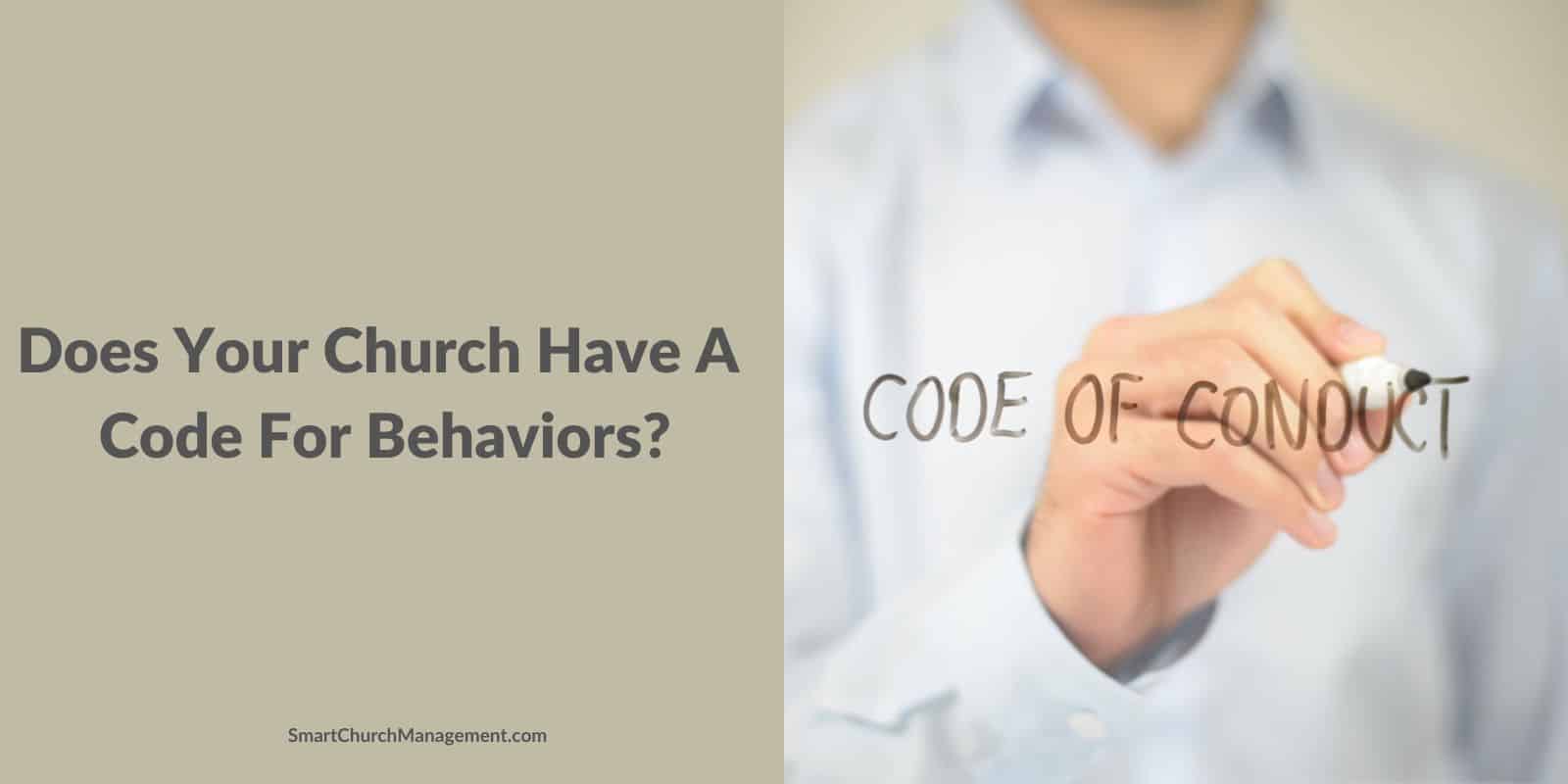Estimated reading time: 6 minutes
Ethical behavior in business seems to have become an option rather than an assumption, as demonstrated by all too familiar news headlines.
Many organizations create codes of ethics and conduct statements to communicate established boundaries and set expectations for employee behavior.
This document also serves as a tool to help guide decision-making and actions that demonstrate self-regulation.
Who Creates a Code of Ethics and Conduct Statement?
Code of ethics and conduct statements are typically developed at the board or leadership level.
This vital document is then filtered throughout the organization through training sessions and the new employee orientation process.
Church employees are not exempt from unethical behaviors and can also benefit from having a written guide for ethical conduct in the workplace.
Commonly agreed upon values and principles outlined in the statement include things like conflict of interest, confidentiality, respect for others, good stewardship, legal compliance, etc.
Providing a written code of ethics and conduct document that employees sign upon hire is the first step in helping them understand the organization’s expectations for behaviors and decision-making.
“The most important persuasion tool you have in your entire arsenal is integrity.”
Zig Ziglar
Organizations define desired behaviors and use driving principles to guide decision-making.
The observed actions of church leaders reflect the organization’s desired behaviors and values.
And what employees observe leaders doing is what they learn to be acceptable.
For instance, if a church leader participates in gossiping about other members, employees may feel that this is acceptable behavior and do the same.

Leadership needs to walk the talk to reinforce these behavior expectations.
Depending on the industry, code-of-ethics and conduct statements can be very short or many pages long.
The more an industry is regulated (i.e., financial services), the more in-depth the statements become.
The key is to create a document that reflects the organization’s desired integrity in a format that employees can easily interpret and understand.
Example Code of Ethics and Conduct Statement
1. Core Values
As defined in the Mission, Vision, and Values Statement, the Core Values will guide the driving behaviors of how the ministry operates and interacts with its members, volunteers, and employees.
Food for thought: Can all employees and volunteers recite the mission, vision, and values statement?
2. Comply with Legal Requirements
Nonprofit organizations are subject to and must comply with numerous regulations to maintain their 501(c)(3) status.
The church’s day-to-day operations will comply with all governing laws and regulations by writing policies and procedures to ensure legal compliance.
For instance, churches need to be aware of and comply with music copyright laws.
Annual audits will be performed to ensure consistency in practice and compliance with regulations.
Food for thought: Are there questionable internal practices that you worry others will uncover and challenge?
3. Conflict-of-Interest
Church leaders and employees must always act in the best interest of the church.
This means that a duty of loyalty supersedes any potential personal gain that could result from avoiding conflicts of interest or anything that may appear to be a conflict.
Food for thought: Do you conduct church business with vendors you have a financial interest in?
4. Confidentiality
Church employees will maintain the highest standard of confidentiality and will share sensitive information only with those who have a need to know.
This includes information about the church’s internal operations, as well as confidential details about church members and volunteers.
Food for thought: Do you discuss personal issues (gossip) with others who don’t need to know?
5. Be a Good Steward of God’s Resources
God supplies church resources – people, time, and money.
Church leaders and employees should be reminded to be good stewards of those resources.
This is done by exercising good time management skills, creating an annual operating budget, and holding leadership accountable for adhering to spending guidelines.
Food for thought: Do you spend church resources only on those things that support its Mission?
6. Personal Use of Ministry Resources
Church resources are purchased with the sacrificial donations of its members and are used solely for the purpose of achieving the church’s mission.
Employees and volunteers should refrain from using ministry facilities, equipment, machinery, or technology for personal use at any time or for any reason.
Food for thought: Do volunteers or employees borrow church vehicles for personal use?
7. Treat Everyone with Dignity and Respect
There should be no respecter of persons in the body of Christ, and employees should be respectful and treat everyone the same, regardless of rank or socioeconomic position.
Food for thought: Do the big givers in your church get preferential treatment?
8. Streamlined Processes
Church staff should continually look for ways to improve operational processes and systems that affect the church experience for members, volunteers, and employees.
Food for thought: Do you take the time to consider how internal processes impact your key customers – members, volunteers, and employees?
9. Proactive Communication
Church leaders and employees should take measures to proactively communicate any information that would benefit others and improve the church or work experience.
Food for thought: Do you hoard information that should be shared with others because it makes you feel important?
10. Compliance with Policy
Church employees will comply with all policies established by the ministry.
Food for thought: Do all employees comply with all church policies?
This code is a basic guide for how the church will conduct its business. Employees are expected to use wisdom, good judgment, and common sense when dealing with others and making decisions.
Customize This for Your Church
These are just a few examples of things that could be included in a church’s code of ethics and conduct statement.
Take the time to think through the desired behaviors and create a Code of Ethics and Conduct statement tailored to your church.
Employees who demonstrate desired behaviors should be acknowledged, and those who do not should be confronted and corrected.
Setting desired behavior expectations and holding employees accountable is the first step in creating a church culture that fosters high standards of ethical conduct.
Why Does This Matter?
An organization’s reputation is built on the consistency of ethical behaviors demonstrated by its leaders and employees. For a church, this reputation is what attracts and retains members, volunteers, and employees.
What standards of behavior does your church commit to?
If you are a member, you can access an editable copy of a code of ethics document by logging in here.
If you are not a member but would like to access an editable code of ethics document, click here.




